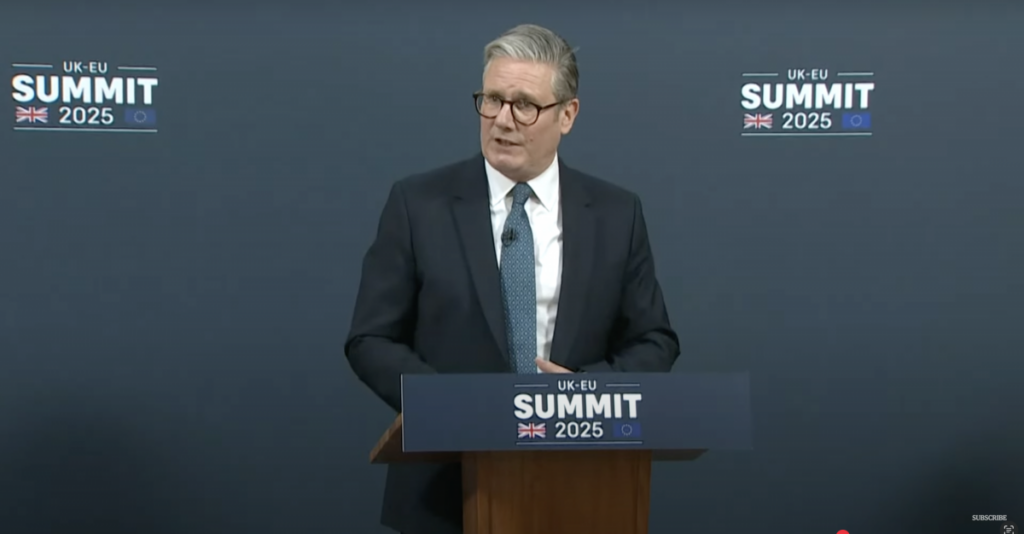‘It’s a reminder that when ideology is put aside and pragmatism is embraced, progress tends to occur.’
Joe Meighan is public affairs manager at The European Movement. The European Movement was founded by Winston Churchill in 1949 to promote European unity and now campaigns to undo the damage of Brexit.
This week’s UK-EU summit in London felt, dare I say it, like grown-ups finally back in the room.
After years of political pantomime, trench warfare, and endless flag-waving photo ops, the tone struck by both Prime Minister Keir Starmer and European Commission President Ursula von der Leyen was something refreshingly different: serious, constructive, and oddly… normal. As someone who’s spent the last few years in the weeds of post-Brexit diplomacy, I can tell you that “normal” is a revolutionary concept.
This was a moment to celebrate for us at the European Movement, not just for the practical progress made, but for what it signals. The summit delivered tangible agreements on trade alignment, youth mobility, security cooperation, and defence. It was less about grandstanding and more about getting stuff done.
But of course, today, we are all talking about fishing, which, as tradition dictates, must happen whenever UK-EU relations are discussed, lest Poseidon himself feel slighted. The new clarity around access and quota-sharing is a positive step. British fishers, many of whom have suffered from years of confusion, red tape, and diplomatic back-and-forth, now have a firmer footing.
It is a bit of sanity in a sector that’s often treated like it’s half the UK economy rather than half a per cent. While the deal may not be perfect for the industry, I am afraid that little is in international diplomacy; sometimes, the difference must be split.
What the summit really showed, though, is that cooperation works. Regulatory alignment to ease trade frictions? Check. A Youth Mobility Scheme to restore opportunities for young Brits to live, study, and work across the Channel? In progress. Joint efforts on defence and security in a volatile world? Absolutely.
It’s a reminder that when ideology is put aside and pragmatism is embraced, progress tends to occur.
Which brings me, inevitably, to Labour’s red lines.
I get it. I really do. After years of being battered by the Brexit culture war, there’s a reluctance to reopen old wounds. The political logic of not touching the customs union or single market made sense for a time.
But that time may be passing.
Public opinion is shifting. Businesses are frustrated. The economic case for closer ties is growing stronger. And frankly, the UK’s red lines are starting to look more like self-imposed roadblocks.
Nobody is suggesting we rewind the clock to 2015. But why not be open to rethinking where national interest and public will intersect? Why not acknowledge that the world has changed, and so should our policies? How long can we allow a nearly 10-year-old referendum that was 52/48 to define how we govern? It may be that the red lines as a manifesto promise are immovable for this government, but it is clear that in the lead up to the next general election, they need to be on the chopping block.
The European Movement has always believed the UK belongs at the heart of Europe. That’s not just a slogan; it’s a vision grounded in shared interests, values, and challenges.
This summit proves what can happen when you trade ideology for dialogue. So, let’s not stop here. Let’s have the courage to ask bigger questions, to rethink inherited positions, and to build a future where we’re not just next to Europe on a map but constructively working with it as partners.
In the coming months, it is absolutely vital that we implement the agreements reached today, thrash out the remaining differences, and make our relationship with the EU reflect the positive notes of this summit. To loosely quote the founder of our organisation, this is certainly not the end, but it may just be the end of a beginning.
Left Foot Forward doesn’t have the backing of big business or billionaires. We rely on the kind and generous support of ordinary people like you.
You can support hard-hitting journalism that holds the right to account, provides a forum for debate among progressives, and covers the stories the rest of the media ignore. Donate today.




